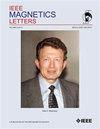Magnetic Susceptibility-Based Detection of Fusobacterium Nucleatum in Human Saliva
IF 1.1
4区 物理与天体物理
Q4 ENGINEERING, ELECTRICAL & ELECTRONIC
引用次数: 0
Abstract
This letter presents an innovative method for rapid and precise measurement of bacteria in liquid samples for point-of-care testing. The method utilizes the bacteria concentration-dependent ac susceptibility of magnetic nanoparticles, allowing for efficient and practical bacterial detection. The ac susceptibility of the magnetic nanoparticles/bacteria aggregate exhibits a decrease proportional to the bacteria concentration, attributed to the influence of bacteria on the magnetic coupling between the magnetic nanoparticles and magnetic dynamic response of the aggregate. To validate the performance of our method, we conducted measurements on基于磁化率的唾液中核梭杆菌的检测
这封信提出了一种创新的方法,可以快速准确地测量护理点测试液体样本中的细菌。该方法利用了磁性纳米颗粒的细菌浓度依赖性交流磁化率,实现了高效实用的细菌检测。磁性纳米颗粒/细菌聚集体的交流磁化率与细菌浓度成比例下降,这归因于细菌对磁性纳米颗粒之间的磁耦合和聚集体的磁动力学响应的影响。为了验证我们方法的性能,我们对健康个体和癌症患者的有核梭杆菌样品进行了测量。结果表明,我们的测量结果与定量聚合酶链式反应(qPCR)分析结果之间存在强大的相关性(相关系数高达0.94),这突出了我们的方法在定量细菌方面的高精度和准确性,与qPCR系统相当。简化的设备不仅降低了成本,而且通过消除对短片段DNA扩增的需要节省了时间,使其成为在护理点检测中快速精确测量细菌的一种有前途的替代品。
本文章由计算机程序翻译,如有差异,请以英文原文为准。
求助全文
约1分钟内获得全文
求助全文
来源期刊

IEEE Magnetics Letters
PHYSICS, APPLIED-
CiteScore
2.40
自引率
0.00%
发文量
37
期刊介绍:
IEEE Magnetics Letters is a peer-reviewed, archival journal covering the physics and engineering of magnetism, magnetic materials, applied magnetics, design and application of magnetic devices, bio-magnetics, magneto-electronics, and spin electronics. IEEE Magnetics Letters publishes short, scholarly articles of substantial current interest.
IEEE Magnetics Letters is a hybrid Open Access (OA) journal. For a fee, authors have the option making their articles freely available to all, including non-subscribers. OA articles are identified as Open Access.
 求助内容:
求助内容: 应助结果提醒方式:
应助结果提醒方式:


